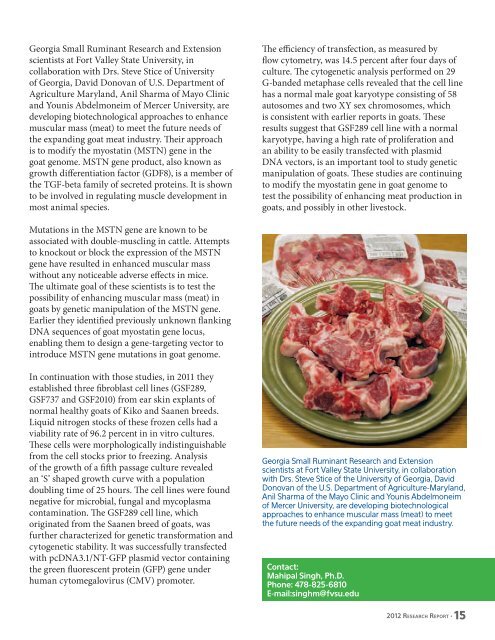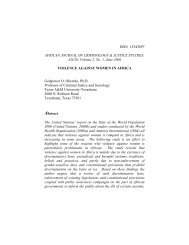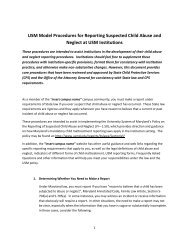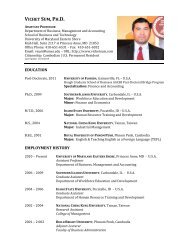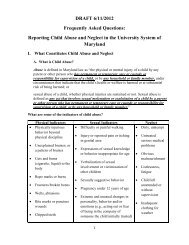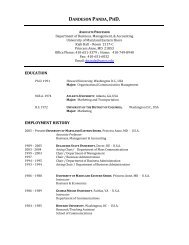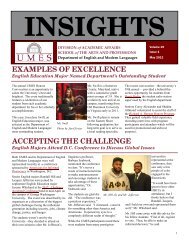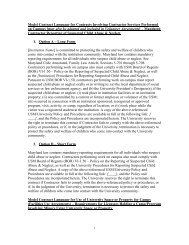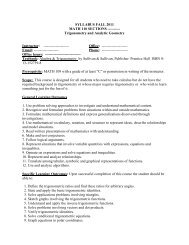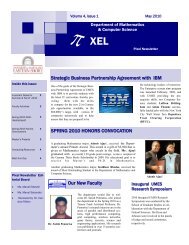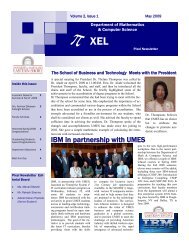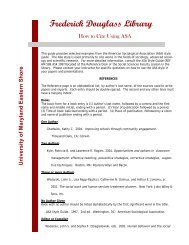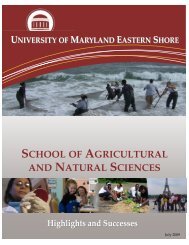FVSU Research Report 2012 - Fort Valley State University
FVSU Research Report 2012 - Fort Valley State University
FVSU Research Report 2012 - Fort Valley State University
You also want an ePaper? Increase the reach of your titles
YUMPU automatically turns print PDFs into web optimized ePapers that Google loves.
Georgia Small Ruminant <strong>Research</strong> and Extension<br />
scientists at <strong>Fort</strong> <strong>Valley</strong> <strong>State</strong> <strong>University</strong>, in<br />
collaboration with Drs. Steve Stice of <strong>University</strong><br />
of Georgia, David Donovan of U.S. Department of<br />
Agriculture Maryland, Anil Sharma of Mayo Clinic<br />
and Younis Abdelmoneim of Mercer <strong>University</strong>, are<br />
developing biotechnological approaches to enhance<br />
muscular mass (meat) to meet the future needs of<br />
the expanding goat meat industry. Their approach<br />
is to modify the myostatin (MSTN) gene in the<br />
goat genome. MSTN gene product, also known as<br />
growth differentiation factor (GDF8), is a member of<br />
the TGF-beta family of secreted proteins. It is shown<br />
to be involved in regulating muscle development in<br />
most animal species.<br />
The efficiency of transfection, as measured by<br />
flow cytometry, was 14.5 percent after four days of<br />
culture. The cytogenetic analysis performed on 29<br />
G-banded metaphase cells revealed that the cell line<br />
has a normal male goat karyotype consisting of 58<br />
autosomes and two XY sex chromosomes, which<br />
is consistent with earlier reports in goats. These<br />
results suggest that GSF289 cell line with a normal<br />
karyotype, having a high rate of proliferation and<br />
an ability to be easily transfected with plasmid<br />
DNA vectors, is an important tool to study genetic<br />
manipulation of goats. These studies are continuing<br />
to modify the myostatin gene in goat genome to<br />
test the possibility of enhancing meat production in<br />
goats, and possibly in other livestock.<br />
Mutations in the MSTN gene are known to be<br />
associated with double-muscling in cattle. Attempts<br />
to knockout or block the expression of the MSTN<br />
gene have resulted in enhanced muscular mass<br />
without any noticeable adverse effects in mice.<br />
The ultimate goal of these scientists is to test the<br />
possibility of enhancing muscular mass (meat) in<br />
goats by genetic manipulation of the MSTN gene.<br />
Earlier they identified previously unknown flanking<br />
DNA sequences of goat myostatin gene locus,<br />
enabling them to design a gene-targeting vector to<br />
introduce MSTN gene mutations in goat genome.<br />
In continuation with those studies, in 2011 they<br />
established three fibroblast cell lines (GSF289,<br />
GSF737 and GSF2010) from ear skin explants of<br />
normal healthy goats of Kiko and Saanen breeds.<br />
Liquid nitrogen stocks of these frozen cells had a<br />
viability rate of 96.2 percent in in vitro cultures.<br />
These cells were morphologically indistinguishable<br />
from the cell stocks prior to freezing. Analysis<br />
of the growth of a fifth passage culture revealed<br />
an ‘S’ shaped growth curve with a population<br />
doubling time of 25 hours. The cell lines were found<br />
negative for microbial, fungal and mycoplasma<br />
contamination. The GSF289 cell line, which<br />
originated from the Saanen breed of goats, was<br />
further characterized for genetic transformation and<br />
cytogenetic stability. It was successfully transfected<br />
with pcDNA3.1/NT-GFP plasmid vector containing<br />
the green fluorescent protein (GFP) gene under<br />
human cytomegalovirus (CMV) promoter.<br />
Georgia Small Ruminant <strong>Research</strong> and Extension<br />
scientists at <strong>Fort</strong> <strong>Valley</strong> <strong>State</strong> <strong>University</strong>, in collaboration<br />
with Drs. Steve Stice of the <strong>University</strong> of Georgia, David<br />
Donovan of the U.S. Department of Agriculture-Maryland,<br />
Anil Sharma of the Mayo Clinic and Younis Abdelmoneim<br />
of Mercer <strong>University</strong>, are developing biotechnological<br />
approaches to enhance muscular mass (meat) to meet<br />
the future needs of the expanding goat meat industry.<br />
Contact:<br />
Mahipal Singh, Ph.D.<br />
Phone: 478-825-6810<br />
E-mail:singhm@fvsu.edu


